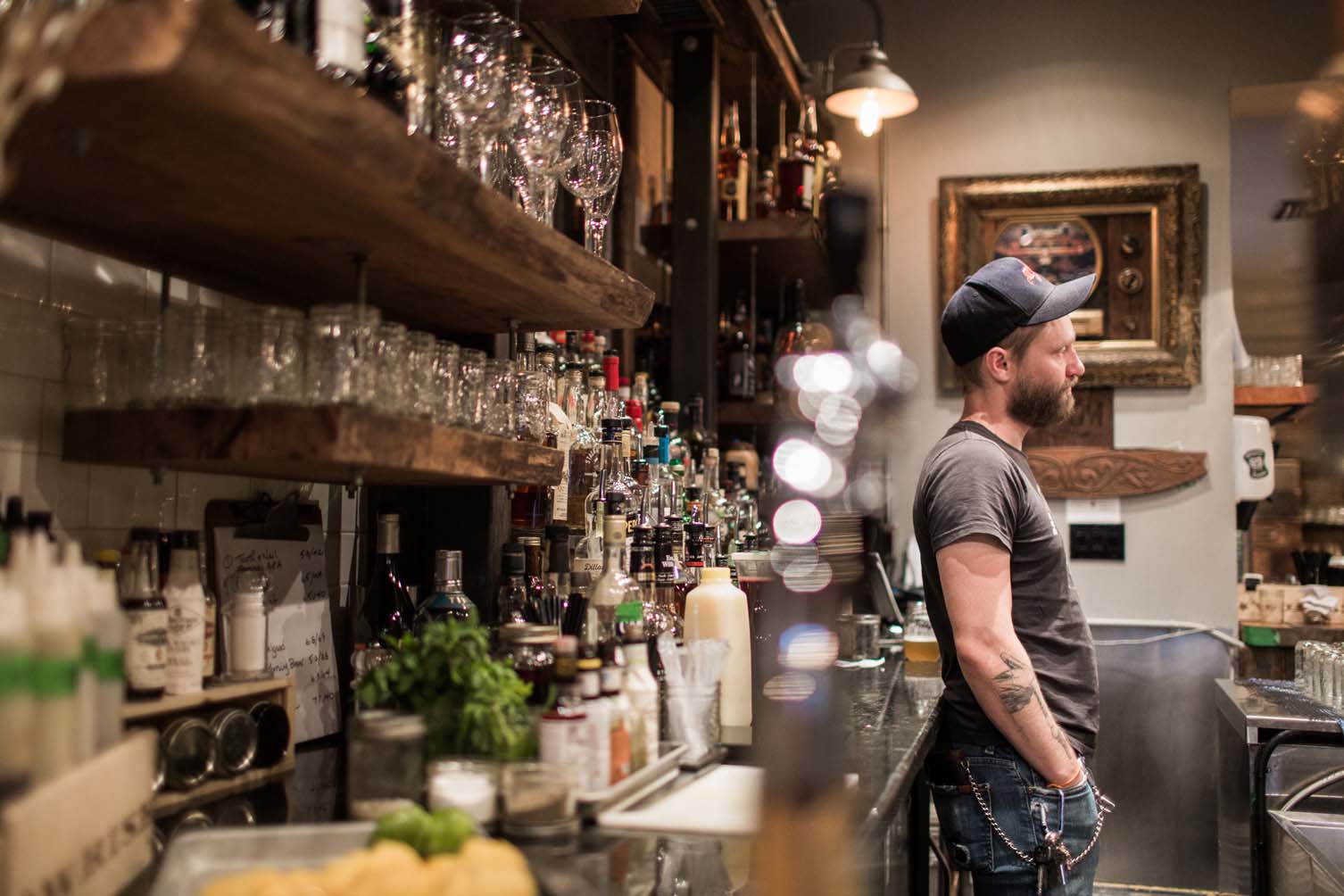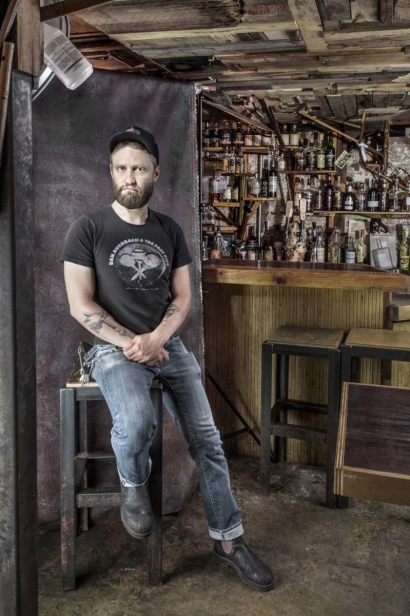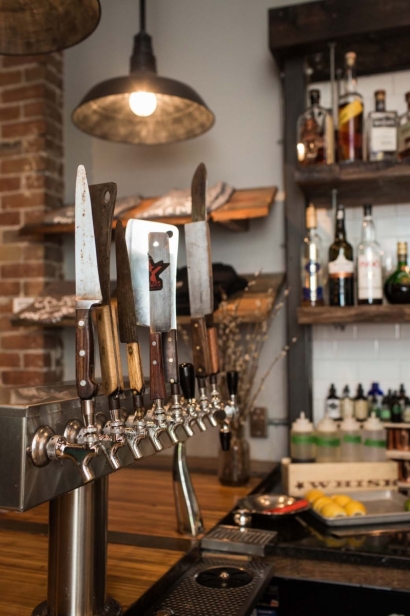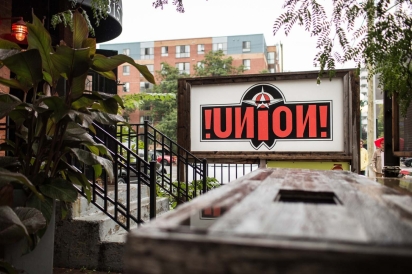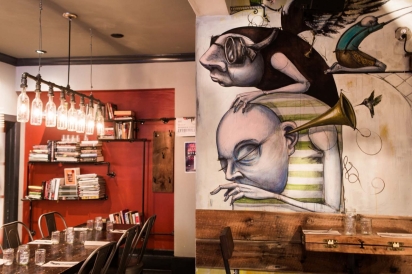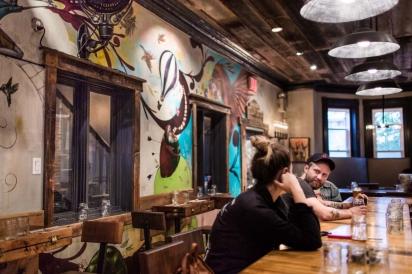The Big Picture - Ivan Gedz
These days, it’s hard not to be swept up in food culture and the language we use to talk about it. Few conversations about food (and drink) stray far from words such as local, sustainable, artisanal and organic — words that enthrall us while describing the latest culinary trend or hot new eatery. At restaurants, it has essentially become our mealtime manifesto, where zealots of all things of gastronomy congregate and feast.
At Union Local 613, the table talk tends to be a little different and, be forewarned, the words you will hear are far less palatable. Words such as hyper-sexualization, misogyny, exploitation and privilege — punctuated by a few expletives — characterize many of the conversations happening at this restaurant and bar on Somerset Street.
When Union opened almost five years ago in a dark, two-storey brick building in the heart of Centretown, owner and manager, Ivan Gedz, along with his partners Matt Fantin, Terrilee Kelford and then-chef Christopher Lord, set about creating their vision for a port in the storm for the industry masses. It started with a few, long communal tables and the city’s best cocktail program — the perfect cool down to the restaurant’s palate-kicking, southern cuisine, now under the charge of chef Darren Flowers. Since then, Union has become one of the city’s most popular restaurants, for food workers and the general public alike — and the platform from which Gedz broadcasts his own particular brand of gastronomic discourse.
“We work in a bit of an echo chamber,” Gedz tells me, “We surround ourselves with people who have similar political viewpoints that are progressive on so many different issues that we forget we are in the minority.” A brief scroll down Union’s Facebook feed reveals, among the usual drool-inducing foodie fodder, a tirade of screeds and whistleblowing with Gedz sitting squarely at the helm. He calls out everything from the inflammatory posts of user review sites to the city’s regulatory frameworks that can all but paralyze small businesses. The space itself seems to embody Gedz’ brooding, revolutionary attitude — the rough-hewn edges and the dark, industrial touches; the worn butcher knives that serve as tap handles; the speakeasy that hides behind a bookshelf in the basement — although he would never be accused of the sort of muzzled speech expected in the illicit prohibition-era establishments.
“When I opened my restaurant, I wanted to change the way business is done — but especially in my industry because it does have a very seedy reputation,” Gedz says. When I meet him at Union to discuss restaurant politics, Gedz is sporting his standard issue attire — a thick beard and ball-cap, a plain T-shirt and worn jeans — but during a dinner service last March at Union, Gedz chose an outfit that would reveal a darker side of the industry.
“In this era of the 24-hour news cycle, sometimes you need to shock and awe,” says Gedz who wore a slinky, spaghetti-strapped dress and high heels during the shift, as did the rest of the male staff. The stunt was meant to highlight the hyper-sexualization of women in the food industry and bring attention to a CBC Marketplace investigation that had followed the story of a few brave young women who had filed complaints with Ontario’s Human Rights Tribunal. Their issue was workplace dress codes; specifically, the short and snug clothing, painful footwear and excessive makeup that they were required to wear while working at various restaurant chains.
Gedz was incensed by the flagrant abuse of power and drove his point home, scantily clad, for the cameras. “I got a lot of flack,” Gedz remembers, “I made a comment when I was in that attire that some people I knew were doing things like grabbing and touching and it was fucking inappropriate. Not only did I feel super uncomfortable, but some of the comments were like, ‘Well, what are you stupid? Look at what you are wearing. You didn’t think people would react?’ Yes, I’m well aware that people are going to look and some of them will giggle, but process that a little bit. When I was actually grabbed and whatnot, I felt violated, legitimately and I can’t describe it any other way. So for someone to dismiss what I was saying is part and parcel of the problem.”
Gedz was also accused of “slut-shaming” by associating “sleaziness” with short skirts and stilettos. Far from obstinate, Gedz was quick to acknowledge his misstep. “We’re not always right," Gedz says. "Everything we do is a learning experience, every conversation, every time I speak about something I find my opinions changing… The slut-shaming thing — my first reaction wasn’t to be like, ‘Can’t you see all the good we are doing?’ It was more like, ‘Oh, fuck. Good point. I’m sorry. How can we keep talking about this?’ None of us is beyond reproach. None of us has got it all right.”
Keeping the conversation going is precisely what Gedz wants to do. He knows it is necessary for progress, not only for women’s rights, but also for workers’ rights in general. “Nothing would make me happier in all of this than if those Lansdowne chains, like Joey’s, didn’t force every woman to wear a dress, and gave their staff benefits. I don’t necessarily want those places to go away, I want them to do better with the cash they have. The only way we get better at this is if we share more with people.”
Within Union’s operations, Gedz is determined to shake up the status quo. For example, Union offers joint benefits to its staff, a rare practice in the food industry. Special events, such as supper club nights featuring local area chefs and bartenders, afford staff an opportunity to manage and market their own events. Gedz also goes out of his way to ensure gender parity in the front and back of the house and would ultimately like to see more visible minorities amongst his staff.
It took some unsavoury experiences in restaurants, Gedz says, for him to recognize that there was a better way to operate. “When I was young, I was stupid. I had never been a manager and I helped enforce some ownership policies like paying cooks cash under the table for overtime rather than give them the time and a half,” he admits, “I am very embarrassed about that. I should have known better.”
Shady business practices never sat well with Gedz who was born into a Toronto family with deep roots in the labour movement. His father was part of the steelworkers union in Southern Ontario; his uncle was with the machinists; and his sister works for the Public Service Alliance of Canada. The Gedz children grew up amid the legend of their Ukrainian grandparents who ran small businesses — groceries, varieties and butcheries — in the outer suburbs of Cabbagetown.
“My baba and dido died seven years before I was born, but there were always these stories about them. One in particular was about one of the last grocery stores. My family was in there cleaning up after they had passed and they found all of these handwritten IOUs written on cardboard. When one of their customers would come into the store, they would notice if they weren’t purchasing their potatoes as normal. They realized that they didn’t have enough money that week and they would just give them potatoes,” Gedz recounts. “Whether that was true or not, it was just drilled into me. That philosophy of sharing and helping just continued to propagate.”
From these roots, Gedz’ soapboxing is approaching something of a heavyweight status within the industry. He loathes many of the culinary institutions and corporate interests that most admire and covet. He abhors Gold Medal Plates and refused a nomination from Air Canada’s En Route restaurant list. Gedz suggested the latter donate $1000 to the Ottawa Food Bank in exchange for listing them in their magazine. En Route refused and Gedz continues to demand a donation from any company looking to capitalize on Union’s brand.
While he seems out to challenge the big players, Gedz has no problem taking a swing at any restaurant, regardless of size or status. “That chef [René Redzepi] at NOMA has his head so far up his ass,” he fires, referring to what many believe to be the world’s best restaurant. Like many restaurants of its calibre, NOMA keeps a steady stream of stages working in its kitchen — generally young, culinary hopefuls who will work for free in order to gain experience in prestigious kitchens. When cooks find employment in independent restaurants they often agree to little to no overtime pay, just so they can keep working. “You could look at me as well, in my life of privilege and say I’m not doing nearly enough as well,” admits Gedz, “but it is a far cry from 30 per cent of my labour force being free labour. That is a twisted, twisted thing.”
Above all, Gedz wants to see a restaurant environment that empowers its people instead of exploiting them. “On a very fundamental level, it is about realizing how important staff are, that you are nothing without them. You can say those words but you really have to pony up and show them. And I think a lot of those practices that are still in play right now with regards to flaunting labour laws are just such a slap in the fucking face.”
Gedz believes workplace equality will only exist when everyone is making the same scratch. In his original vision for Union, dishwashers would be paid as much as the owners. When asked what stops him from introducing wage parity at Union, where dishwashers are still paid $12, he shakes his head, “The numbers just don’t add up.” Gedz says he is still trying to fi gure out how to make it work. “If I had my druthers, there would be no tipping at the restaurant. We would just charge whatever it is,” he says.
Gedz would like to see Union become the first tipless restaurant in Ottawa, which would allow for better distribution of wages. Still, he fears that the industry could be fundamentally flawed; as the true cost of labour (and food) is something few of us are willing to pay for.
“This is the issue with food in general. We all know there is something incredibly perverse with the $3.99 pineapple coming from Guatemala. Think of all the people needed to grow it, pick it, pack it and ship it. There’s just no way,” insists Gedz, adding, “We need to have a conversation about sustainability with regards to ourselves, simultaneously with what we are putting inside of ourselves.”
As Gedz likes to say, change is a slow train coming, but keeping the conversation fired up will at least provide some much-needed fuel.
Union Local 613
315 Somerset St., W., Ottawa, Ont.
union613.ca, 613.231.1010


